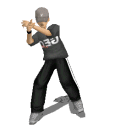Tuesday, January 31, 2006
VISITORS


| Word: | ||
| by: | ||
Word of the Day
Word of the Day is a free service of The Free Dictionary
Article of the Day
Article of the Day is a free service of
The Free Dictionary
This day in history
This day in history is a free service of
The Free Dictionary
Today's birthday
Today's birthday is a free service of
The Free Dictionary
Quotation of the Day
Quotation of the Day is a free service of
The Free Dictionary


Previous Posts
- Today's GIF
- Today's CARTOON
- Today's CARTOON
- Today's INFO From: Sada pragash senthil @ Span sy...
- Today's SITEWebsite that looks like a OS ( U need...
- Today's CARTOONFrom: Kiranmayi. V. R @ adecco (Ba...
- Today's STORYFrom: Rajesh @ Sasken Communication ...
- Today's CARTOONFrom: Hari Rama Chandran @ Tuticori...
- Today's QUESTION Who said English is easy ? fill ...
- Today's PHOTO




1 Comments:
How to keep body odour at bay
EVERY region of the human body has a different odour and sometimes, its origin may easily be identified. There are three important factors which cause odour in human body:
* The pattern and type of secretory glands on the skin surface.
* The positioning of the skin itself. The armpits, for example make it very difficult for sweat to evaporate and so a characteristic colour is produced.
* The concentration of bacteria. The number of bacteria is variable in different parts of the body, being maximum in parts like scalp, axilla, genital areas and the feet.
There are three types of secretory glands on the skin. Sweat glands are the most widely distributed and their function is temperature regulation. The average person loses at least half a litre of sweat every day and this figure rises during the hot season and when physical exercises are done. Sweat has a slightly acrid smell. Areas like the feet pose a problem because the sweat becomes trapped by socks and shoes. Heavy odour associated with the armpits is because the sweat cannot evaporate easily.
There are two other glands, the apocrine and sebaceous glands. The apocrine glands are also a type of sweat glands but they have a limited supply of sweat on the armpits, genital areas and eyelids. Aprocrine sweat is odourless and rich in fats, protein and other organic material, all of which make it a breeding ground for bacteria. The bacteria decomposes the sweat to produce the characteristic body odour.
The third type of secretory glands are sebaceous glands. These are distributed all over the body, with the exception of the palms and the soles. Sebaceous glands secrete an oily lubricant known as sebum which contains cholesterol, fatty acids, waxes and proteins.
In case of any skin disease, use a medicated disinfectant. In summer, a bath twice a day is essential to wash off sweat and grease, even if some vital materials are destroyed in the process of having a bath. In case of dry skin, the use of soap should be discontinued for few days.
If at all soap is to be used, use glycerine soap, but avoid caustic soda soap. The most effective remedy for treating prickly heat is to take a small piece of sandalwood and rub it to a paste on a stone with rose water. Mix in a pinch of powdered alum and apply to the affected skin twice or thrice a week depending upon the condition of the prickly heat.
A bath can be taken in running water, standing water, in tubs, under the shower but bathing in running water is very beneficial and tub bath is more fashionable. When we sit in a tub, all the body dirt dissolves in the water but sticks on to the body again, thus defeating the very purpose of bath cleansing.
Excessive sweating may be related to low grade infections, internal disorders, other medical problems and menopause. Most anti-perspirants contain some type of aluminum salt that temporarily reduces the transmission of perspiration to the skin surface. None will completely stop perspiration, nor is this desirable, because excessive local dryness would result in severe skin problems.
Post a Comment
<< Home